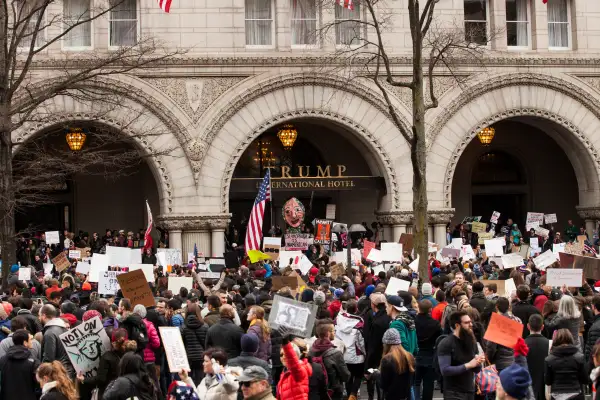Trump Hotels Are Getting Hammered With Horrible Online Reviews

President Donald Trump has been described as an Internet troll. Yet for months his critics have been trolling him right back, not just via social media but by bashing Trump hotels, restaurants, and resorts with bad online reviews—and the strategy could mean upwards of $100 million in lost revenues for Trump companies.
As Business Insider reported, a new study from the online rating market technology company Signpost shows that the average online ratings for Trump properties in the U.S. have declined about 40% since Trump became president. Researchers looked at three years of user review ratings at Yelp and Google to come up with the data, which indicate that 29 Trump properties now have an average rating of 3.7 stars out of 5. Around the 2016 election, the properties collectively had a 4-star rating.
The ratings dip may seem minor, but previous studies have shown that even a small decrease in online ratings can translate into a significant decrease in revenues. Signpost researchers estimate that the ratings drop would equate to a loss of at least $66 million over four years for Trump businesses, assuming the current review trends continue. "These calculations are conservative and according to the most recent revenue estimations," the report stated. "The actual cost if these trends continue could be in excess of $100 million."
It appears as if the lower ratings at Trump properties are mostly about politics. There is a long history of people attempting to manipulate online ratings by posting fake or ironic reviews on everything from Confederate flags to Paula Deen's books to voice political opinions.
In December, the Trump Grill inside New York City's Trump Tower lost a full Yelp star when online raters were inspired to bash the restaurant in the aftermath of a scathing Vanity Fair review. Similarly, the Mar-a-Lago Club, the Trump resort in Florida dubbed (by Trump) as "the winter White House," has drawn the wrath of angry online reviews—as well as some supporting Trump that are just as fake—for weeks. At last check, Mar-a-Lago, which charges a $200,000 initiation fee for new members plus $14,000 in annual dues, has a 2-star rating on Yelp. This is so even though an alert on Yelp explains that the site has been actively removing "both positive and negative posts that appear to be motivated more by the news coverage itself than the reviewer’s personal consumer experience with the business."
Interestingly, the Signpost study did not incorporate data from one of the biggest online review sites for hotels, TripAdvisor. In many cases, it appears as if Trump property ratings on the site are faring quite well. The Trump hotel in Las Vegas, for instance, gets 4.5 stars out of 5 based on 10,000+ reviews. Trump's hotel in Washington, D.C., has a 4-star rating on TripAdvisor, which sounds good but actually makes it the #100 highest-ranked hotel in the nation's capital out of 140 rated on the site.
For the sake of comparison, the Trump Hotel Washington, D.C., has just a 2.5-star rating on Yelp. "It's too expensive for the average Trump chump to stay here, but I think there's an RV park right outside the city for them with free water and sewer hook-ups," one reviewer wrote of the property recently, awarding it a 1-star rating. "A tremendous, just tremendous, bigly bad experience," another 1-star review mocks.
Finally, the Los Angeles Times recently reported that there are some bargain-hunting travelers who are voicing their opposition to Trump by refusing to stay in his hotels at even dirt-cheap rates. Hotwire and Priceline both have opaque bidding options that allow customers to get cut-rate reservations on hotels with two caveats: they cannot be changed, and you don't know where you're staying until a bid is accepted. Lately, many deal seekers have turned to the forum BetterBidding.com for help from fellow travelers to figure out the likelihood that a mystery property listed at a cheap price could be a Trump property.
"Help," a typical message states. "I want to avoid Trump hotel."
